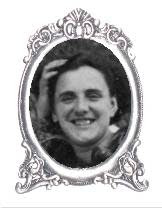„…she just did not like them.”
Mrs. Helena worked as a clerk before war. In 1932 she married Edmund Majewski, who – as a tram operator belonged to the working group aristocracy. Owing to his high income Mrs. Helena was able to quit working and take care of the house. Soon her firs daughter – Hania was born. Unfortunately, she had appendicitis and due to application of purgation medicine by incompetent doctor, she died.
Interestingly, Mrs. Helana had a negative approach to Jews at that time. She was not ‘a fighting anti-Semite’; she just did not like them…
„It was better not to know”
Mr. and Mrs. Majewski lived in Warsaw, at Obozowa Street No 81/36. It was a moderately safe place. Neighbors and tenants of the block of flats who saw Ada on the corridors surely knew about her origin, however no one asked her. It was better not to know.
The Majewski Family moved out of that location after war. No one who would remember Ada lives in the block of flats at Obozowa Street anymore.
„the whole family could be punished for this with death penalty.”
Mrs. Helena had two sons apart from her daughter Hania. In 1941 Bohdan was born and Andrzej – three years later. The war took her husband though. Germans took him to the concentration camp in Gross-Rosen, what was clearly remembered by the small – at that time – Bohdan. He remembers that Germans ordered all men to leave their homes and he ran after his father. A soldier hit him in his head then. It was the last time when he saw his father.
Ada was taken to the Majewski Family’s house following the mass escape from the ghetto.
She was 12 years old then and pretended to be a cousin and an au pair of the small Bohdan.
Taking a Jewish girl to her home, Mrs. Helena was accepting a significant risk. Her whole family could be punished for this with death penalty. Such a stressful situation was hard to take by Mrs. Helena’s husband, who at first – due to concern for his family opposed taking Ada. After a while they managed to get the Aryan documents for Ada, according to which her name was Krysia. All of them felt a little bit more secure. Ada (Krysia) stayed at Mrs. Majewska’s house until she was taken to Germany for obligatory works.
„Just among the World’s Nations.”
Mrs. Helena and Ada met first in 1948 or 1949, when Ada returned from Germany. After the war, Mrs. Helena and her children were the only close people to Ada. The war took her whole family. Soon Ada went to Łódź, her home city. This is where she met Samuel Willenberg, her future husband. They got married in 1952 and both moved to Israel.
After the war Mrs. Majewska moved to Nowy Dwór Gdański, where she started to run a confectionery. She returned to Warsaw however, as thanks to her husband’s political party friends she got a job as a cook in the Central Committee of PZPR. In 1956 she planned to go to Israel using Ada’s invitation, in order to plant an olive tree in Yad Vashem. Her passport was recalled one day before her departure however.
Mrs. Majewska and Ada met in the beginning of the 60’s in Bulgaria. Mrs. Majewska’s son – Andrzej planted an olive tree on behalf of her much later.
Ada Willenberg entered her name as the ‘Just” in Yad Vashem. On July 26, 1982
Mrs. Helena Majewska was awarded with the medal and an Honor Diploma „Just among the World’s Nations”.
Mrs. Helana Majewska died on June 10, 1985. Ada remains in touch with her children, visits Poland every May and taught Polish language to her children.
Mrs. Helena Majewska - saving a small Jewish girl’s life – saved many other lives at the same time.


Brak komentarzy:
Prześlij komentarz